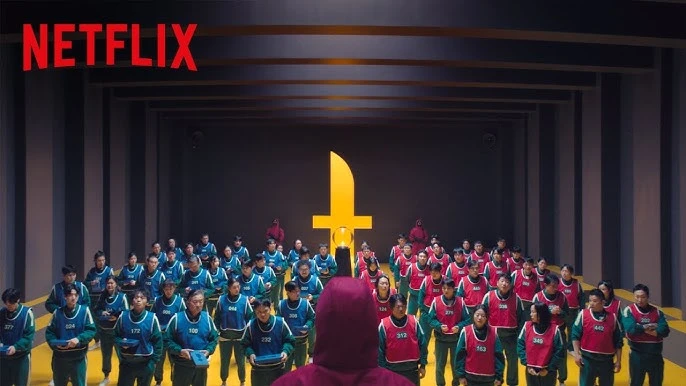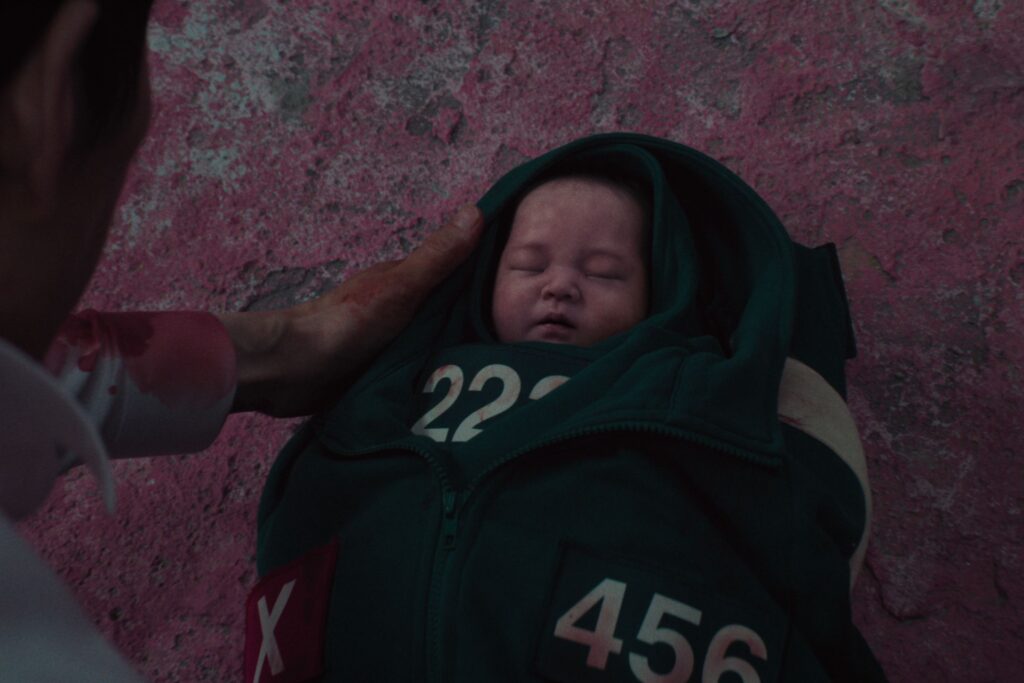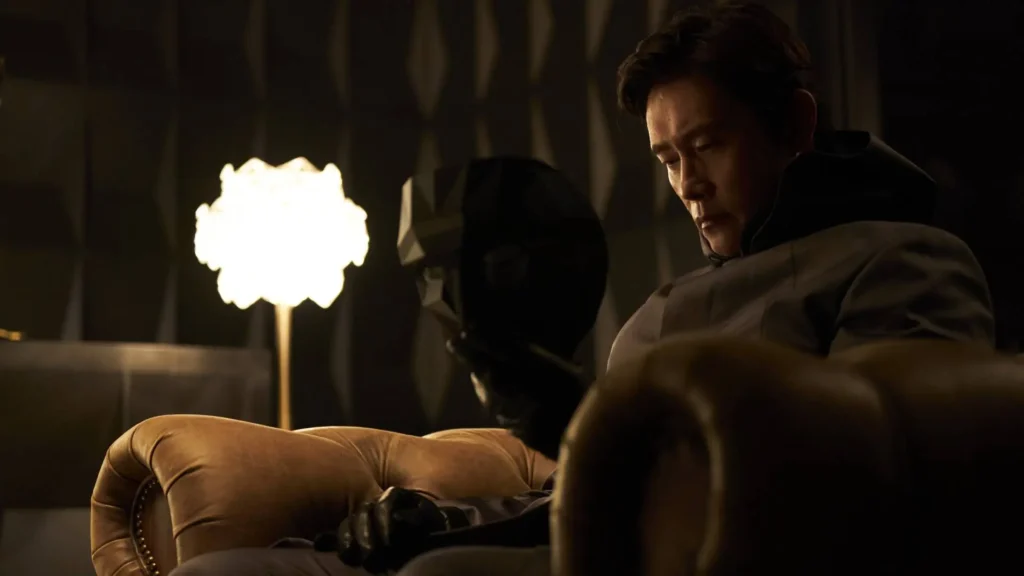Some finales slam the door shut with a bang, but Squid Game Season 3 ending chooses a different path, it steps through, turns back, and quietly changes the locks. Since its debut, Squid Game has been far more than a stylish survival thriller. Beneath the neon carnage, it has always functioned as a razor-edged parable about class, desperation, and the cruel logic of systems designed to pit people against one another.
The ending of Squid Game season 3 doesn’t hinge on a shock reveal or a sudden twist; instead, it delivers something harder, heavier, and ultimately more human. It confronts the oldest question the show has asked since that first deadly round of “Red Light, Green Light”: What happens if someone refuses to play by the rules altogether? The answer is not victory in the conventional sense, but something deeper, a defiance that transforms defeat into a kind of triumph.
Quick Premise Refresher

Before we dive into Squid Game Season 3 finale, let’s do a quick recap. This season begins in the wreckage of Season 2’s failed rebellion (here’s Squid Game 2’s ending explained). The Games, despite exposure and chaos, have endured, now modernized with new technology and more theatrical violence.
Seong Gi-hun (Lee Jung-jae) returns as the heart of the story, older, scarred, and even more unwilling to look away from suffering. His path collides once again with the masked overseer Hwang In-ho, the Front Man, whose conscience remains an ongoing fracture beneath the armor.
Meanwhile, Detective Hwang Jun-ho survives his cliffhanger fate and works quietly to expose the machine from within. Around them swirl fresh recruits, bound by familiar desperation, each one lured by promises of fairness and fortune that are, as always, rigged against them. The central conceit remains chillingly intact: people crushed by debt are coerced into “fair games” where only one can win, while wealthy spectators sip champagne and wager from behind mirrored glass.
Also, read Silo Ending Explained: VR Lies, Doomed Landscapes & That Mind-Blowing Reveal
The Final Game: “Sky Squid”
Squid Game Season 3 closes with a new arena called “Sky Squid,” a lattice of platforms suspended over a void. At the center sits a glowing red START button, the trigger that officially begins the round. Two survivors remain: Gi-hun and Myung-gi, a player whose nervous politeness curdles into desperation at altitude. The twist lies in the cruel staging: a newborn baby, whose mother died earlier in the Games, has been entered as a player and strapped into a carrier on the platform.
The rules demand that the game begin only once the START button is pressed, meaning any death beforehand does not count. When Myung-gi slips and falls to his death, the system declares it irrelevant that the game has not yet begun. With the infant wailing beneath the lights and the VIPs murmuring behind mirrored glass, the grotesque design becomes clear: victory requires pressing the button, condemning an innocent child in exchange for survival.
Gi-hun’s Choice

Exhausted, bloodied, and staring at the baby, Gi-hun recognizes the final cruelty: to win is to sacrifice humanity itself. He looks toward the VIPs’ gilded box, then back at the child. His voice, almost flat with resignation, delivers the line: “We are not horses. We are human.”
Rather than press the button, he steps deliberately off the platform. His death is both protest and verdict, louder than any shot fired in the arena. By refusing to play, Gi-hun denies the Games their spectacle, protects the child’s life, and proves that the only true way to “win” is by not participating at all.
What Squid Game Season 3 Ending Means
So, what is all that we can really deduct from Squid Game season 3 ending, let’s break it down below!
Humanity as Cheat Code
Contracts and forced consent have defined Squid Game since its first episode. Gi-hun’s refusal to press START becomes the ultimate act of rebellion: the denial of consent itself. By stepping off the platform, he shows that the only way to resist a system built on cruelty is to opt out entirely, even at the cost of his life. The baby represents a future held hostage by violence and debt, and sparing her transforms Gi-hun’s loss into the series’ clearest declaration—that some debts should never be paid in blood.
The Front Man’s Cracked Mask

In-ho, the Front Man, watches without intervening as Gi-hun falls. Yet afterward, his actions reveal a subtle fracture: he rescues the baby, orders the arena destroyed, and directs Gi-hun’s winnings toward his daughter in the U.S. These gestures are not redemption, he remains complicit in brutality but they are penance of a kind. The demolition erases evidence, but it also acknowledges that Gi-hun’s refusal was something the system could not contain. The moment suggests that even the guardians of cruelty are vulnerable to humanity’s disruptive force.
Capitalism’s Cradle
The infant’s presence as a “player” is the series’ darkest satire. Born into the Game before she can even lift her head, she embodies a generation already shackled to inherited debt and systemic cruelty.
Gi-hun’s leap refuses to make her life collateral, reframing Squid Game Season 3 finale as not just a personal sacrifice but a policy in miniature, a statement that the future must not be commodified. The global recruiter cameo in the final scene underscores this: the Games are no longer confined to Korea; the system is universal, alive wherever desperation meets power.
Also, read YellowJackets Ending Explained: Antlers, Altars and Adults Angst
Closing Thoughts
Squid Game Season 3 ending isn’t about triumph or even survival. It ends with a sacrifice that reframes the entire series. Gi-hun’s leap isn’t about creating a hero; it’s about proving that even in a system engineered for cruelty, an ordinary man can choose differently. The spectacle, the platforms, the lights, the VIPs who become irrelevant the moment he steps away.
What lingers is a stark tableau: an empty ledge, a crying child, and silence heavy with truth. “We are not horses. We are human.”
That line echoes louder than any explosion, turning loss into a kind of moral victory. And though the final alleyway scene suggests the Games will endure globally, Gi-hun’s choice endures too. The machine thrives on compliance; his refusal proves that humanity survives in resistance, however brief, however costly.
Frequently Asked Questions (FAQs)
1. Did Gi-hun really die and does he “win”?
Gi-hun dies when he jumps before pressing START, which means the game never officially begins. He doesn’t “win” in the official ledger, but thematically, he achieves the higher victory. By protecting the baby and denying the VIPs their spectacle, he reframes defeat as defiance. His death isn’t a failure; it’s the series’ most human statement, proving that sometimes survival isn’t the only kind of triumph.
2. Why didn’t Myung-gi’s death count?
Because the START button was never pressed, the round was technically not in play. The system dismisses his fall as irrelevant, a chilling reminder that Squid Game’s “fairness” is a legalistic sham. The detail highlights how bureaucracy can hollow out morality, valuing procedure over people.
3. Is the Front Man redeemed at the end?
Not fully. Hwang In-ho remains complicit in designing cruelty, but Gi-hun’s leap cracks his armor. He saves the baby, destroys the arena, and delivers Gi-hun’s prize money to his daughter Ga-yeong. These are gestures of penance, not absolution. His actions suggest awareness, not transformation, showing that even those deep inside the system can be rattled into small, reluctant acts of humanity without fully escaping their role in the machine.
4. Does the demolition mean the Games are over?
No. The arena falls, but the Games continue in new forms. The final alleyway scene with a recruiter targeting players abroad confirms the system is global, not local. The demolition works symbolically, erasing the site that witnessed Gi-hun’s refusal. But as long as inequality and desperation exist, the Games adapt, recruiting new players in new places. The message is clear: erasing one arena doesn’t dismantle the system; it only shifts its stage.